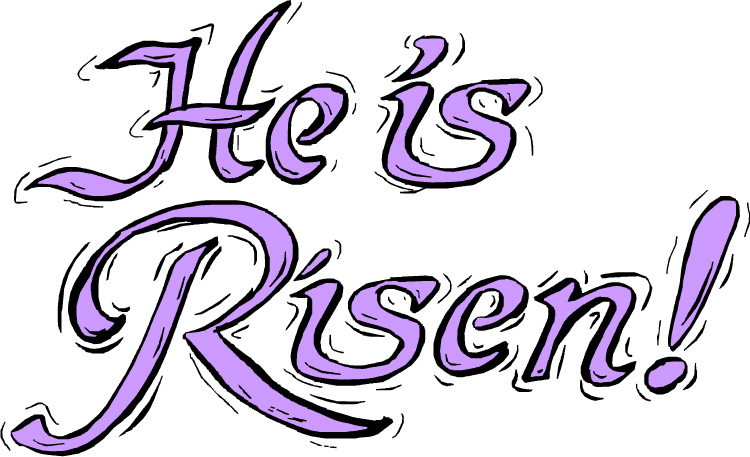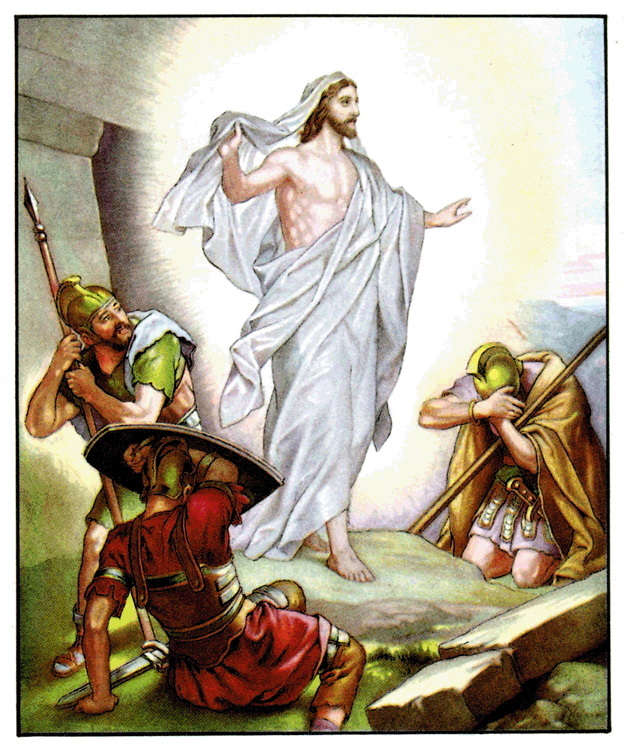This video reveals fresh insights into the biblical Passover and the Feast of Unleavened Bread.
Category Archives: Yeshua/Jesus
The Resurrection of Messiah Yeshua Prophesied in the Hebrew Scriptures

In recent years, as many Christians have been rediscovering the Hebrew roots of their faith, some Bible teachers are casting a shadow of doubt and skepticism on some of the most fundamental aspects of the Christian faith.
Such cornerstone Christian doctrines as the deity of Yeshua, his incarnation, his virgin birth, his blood atonement and his bodily resurrection are now being called into question by some skeptics. They claim that these concepts were not components of the original apostolic faith, but were added later, and that the Apostolic Scriptures were redacted by the early church fathers to reflect a diluted Hebraic-based faith melded with some popular pagan concepts of the day.
Indeed, a cursory study of the writings of the Anti-nicene church fathers reveals that there occurred much syncretizing between Christianity and Greek or Hellenistic (pagan) thought and a rejection of much of what was considered to be Jewish, such as the Torah (law of Moses). But what aspects of the apostolic faith did they indeed keep without replacing it with a paganized counterfeit? What aspects of Christian orthodoxy are original to the apostles? How can we know whether what we have learned in the Christian church is the truth or not? These are serious questions that need answers. If one comes to the wrong conclusion on these issues, the eternal consequences could be devastating!

Sadly, some Believers have bought into the line of reasoning without studying the issues carefully that the deity of Yeshua, his virgin birth and incarnation, the blood atonement and his bodily resurrection are pagan concepts. Some make these bold assertions based on the belief that these concepts are foreign to the Hebrew Scriptures (Old Testament). Is this true? This author has proven in other works posted on our ministry web site (www.hoshanarabbah.org) that the deity and incarnation of Yeshua, the virgin birth, and the blood atonement are Hebrew, not pagan concepts, and are rooted firmly in and prophesied about in the Hebrew Scriptures.
In this teaching article, we will discuss the issue of the bodily resurrection of Yeshua. It must be acknowledged that if Yeshua did not resurrect from the grave after his crucifixion then he failed to defeat sin, death and the grave, and it therefore follows that he is not the Savior and Redeemer of man, man has no hope of a bodily resurrection or afterlife himself, and as Paul said, let us eat and drink, for tomorrow we die (1 Cor. 15:32).
There were those who questioned the fundamentals of the faith in Paul’s day, for he spoke of those who had left the faith and had become spiritually shipwrecked (1 Tim. 1:19). Furthermore, he was not so self-assured to think that even he could defect from the very faith he preached and become himself a spiritual castaway or reprobate (1 Cor. 9:27). This should be a word of warning to us all to diligently search out the Scriptures, and to prove whether what we have been taught to believe squares with the Hebrew Scriptures or not. That is the basis for determining the truth of what is written in the Apostolic Scriptures—nothing more and nothing less.
Scriptures and Analysis
In this brief study, we will present to you a series of texts from the Hebrew Scriptures (or Old Testament) with commentary that foretell of a Messianic Redeemer dying and then bodily resurrecting.
Psalms 16:10, For thou wilt not leave my soul [nephesh] in hell [sheol]; neither wilt thou suffer thine Holy [chaseed or faithful, kind, pious, devout, saint, godly] One to see corruption [shakhath or decay of the grave, according to The Theological Wordbook of the Old Testament].
COMMENT: To whom is this verse referring? Who is YHVH’s Holy One? This is obviously not a reference normal humans whose bodies and souls go into the grave at the time of death (so says this verse) to await the resurrection, and where they decay into dust. Who in Scripture, but Messiah Yeshua resurrected after three days before his body could corrupt (start to decay)? According to Jewish thought, bodily decay starts after three days.
Psalms 49:15, But Elohim will redeem my soul from the power of the grave: for he shall receive me. Selah.
COMMENT: This is a generic reference to the resurrection of the righteous. Using a kal v’khomer or light and heavy (a fortiori) rule of logic (or Rabbi Hillel’s first law of Biblical hermeneutics/interpretation) we can reason that if the righteous dead are resurrected how much more so YHVH’s righteous Messiah?
Psalms 22:26, The meek shall eat and be satisfied: they shall praise YHVH that seek him: your heart shall live for ever.
Continue readingThe Feast of Unleavened Bread—Insights from Nathan

The Feast of Unleavened Bread Is a Commemorative Ritual
Passover going into the first day of the Feast of Unleavened Bread is the birthday of the nation of Israel. In ancient times, universal Israel came together in Jerusalem to celebrate this event. Today, redeemed Israelites or the Israel of Elohim (Gal 6:16) come together to celebrate these divine appointment sacred convocations (1 Cor 5:6–8) cp. 11:17–29).
Abstaining from leavened bread for seven days is symbolic of Elohim’s people separating themselves from sin and entering into a holy or set-apart relationship with him. Without holiness, no one ever see Elohim (Heb 12:14). Set-apart from what? The world, the flesh and the devil (Rev 18:4; 2 Cor 6:14–18; John 17:11, 14; Jas 4:4)
Removing leavening from our homes is a symbolic activity just like taking communion, being baptized for the remission of sins, or building a sukkah during the Feast of Tabernacles. As humans, we need symbolic commemorative occasions for several reasons. They give us a sense of history by helping us to understand the past, so that we can move forward into the future knowing who we are and where we’ve come from. They give us guidance so that we’ll learn from the lessons of history, both the good and bad ones. Our American culture is full of symbolic rituals and commemorative acts and markers (Christmas, Easter, birthdays, anniversaries, Independence Day, Memorial Day, Veterans Day, Thanksgiving Day, statues, historical markers, monuments, museums, heritage sites, etc.). Likewise, Biblical commemorative rituals help us in several ways.
- They help us to both recall and commemorate past and future events.
- They help us to understand who we are by recalling where we’ve come from which in turn helps us to understand where we’re going.
- They can be something physical that helps us to wrap our minds around difficult-to-understand spiritual principle.
- They are something physical that help to point us toward a spiritual reality. They help to raise our hopes and our eyes above our mundane existence and strengthen our faith as we move toward the higher goal or reality to which the ritual or commemorative event points.
- They help us to teach and to pass on to each new generation not only about our past history, but our future hope.
Leavening Is a Picture of Sin
The observance of the Feast of Unleavened Bread is a symbol of our commitment to turn towards righteousness and turn away from sin. How serious we are about removing physical leaven from our homes in compliance with YHVH’s commands is an indicator of how serious we are about removing sin from our lives.
While leavening makes bread rise and is therefore a symbol for pride, leavening is also a symbol of decay. The rising of the dough is only possible by the natural process of fermentation or decay through fungal activity. In ancient times, a pinch of fermented or sour dough was placed into a batch of unleavened dough to make it sour and cause it to rise. Yeast is a living micro organism that is classified as a fungi. Fungi feed on both living and dead and decaying organic matter. Yeast turns food sour through the process of fermentation and this begins the process by which something dies. Yeast is an apt metaphor for the corrupting influences of sin, which invades our lives and turns our souls from sweet to sour leading to spiritual death. Were it not for the curse of death because of Adam and Eve’s sin, it’s quite possible that fungi would not exist.
When YHVH commands us to remove the leavening from our homes during the Feast of Unleavened Bread, he’s teaching us an important lesson: We must remove the contagion of sin from our lives if we’re to be sweet, pure, sinless and holy (or set-apart unto YHVH). Sin, like yeast fungi, causes decay and death, and to remove yeast from our homes is like removing sin from our lives, which brings about a reverse of the curse of death resulting in eternal life.
In ancient times, unleavened bread was made to rise by the injection of sour dough or leavened dough into the pure and undefiled unleavened lump of dough. Unleavened dough has nothing old from the past that is added to it. It’s a totally new lump. That’s what were to be in Messiah — a new creation, or a new lump.
Purge out therefore the old leaven, that ye may be a new lump, as ye are unleavened. For even Christ our passover is sacrificed for us. Therefore let us keep the feast, not with old leaven, neither with the leaven of malice and wickedness; but with the unleavened bread of sincerity and truth. (1 Cor 5:7–8)
Through Messiah, our past sins—our past sour history is broken off (the sour dough yeast from the past, Rom 3:25) and has been forgiven and we get to start out totally new! What’s more, every time we sin, if we confess our sin and repent of it, he forgives and cleanses us and make us new yet again (1 John 1:9).
Unleavened bread is a picture of the life of Yeshua unspoiled by the taint of sin and death. Even his body, after his death, resurrected to life before decay could set in. He truly was the Lamb of Elohim who was without blemish in every possible way. When we eat unleavened bread, it’s symbolic of putting on or into ourselves the righteousness of Yeshua.
Paul mentions the unleavened bread of sincerity and truth (1 Cor 5:7–8). Sincerity and truth is in contradistinction to the concept of the leaven of the Pharisees, which is hypocrisy (Luke 12:1). Hypocrisy is a form of self-inflated ego or pride where one thinks that he is better than he really is or better than someone else based on outward show, but in reality, it’s a sham. The Greek word for hypocrisy (hupokrisis) literally means “to play act like an actor, to pretend, to simulate, to feign.” This kind of sinful behavior doesn’t belong in one who is a new, unleavened lump in Yeshua.
This feast helps us to focus on putting sin out of our lives and replacing it with righteousness or the righteous works of obedience to Elohim the opposite of which is sin. This can only be done through a relationship with Yeshua the Messiah and with the help of the resurrection power of Yeshua living in us through his Holy Spirit. This is why the next feast to occur after Unleavened Bread is the Feast of Pentecost, which celebrates the receipt of the Holy Spirit who came to empower us to keep the laws of Elohim (the opposite of sin) by writing them on our hearts—that is, giving us the internal desire and fortitude to obey them.
Unleavened Bread Is the Bread of Affliction
Scripture calls unleavened bread “the bread of affliction [poverty, misery, to be humbled, to put down, to stoop, to be depressed, to come low].”
Thou shalt eat no leavened bread with it; seven days shalt thou eat unleavened bread therewith, even the bread of affliction; for thou camest forth out of the land of Egypt in haste: that thou mayest remember the day when thou camest forth out of the land of Egypt all the days of thy life. (Deut 16:3)
Unleavened bread pictures the Israelites coming out of Egypt where they were afflicted in bondage under the cruel slavemaster’s whip. But even as each of us has been set free from spiritual enslavement to Satan and this world, we still have to endure the wilderness of this life en route to the Promised Land of our spiritual inheritance in the kingdom of Elohim. As Yeshua suffered for us that we might have life through him, we must follow in his footsteps as we endure suffering and persecution to be victorious over the world, the flesh and the devil even as he was.
The Resurrection Life of Yeshua
Yeshua resurrected during the Feast of Unleavened Bread. The importance of this event can’t be overemphasized. Now through the power of his resurrected life, believers have the ability to overcome the power of death as represented by yeast and leaven, which is a picture of sin, and to live in an unleavened or sin-free state.
Unleavened Bread Versus Manna
During the Feast of Unleavened Bread, YHVH commands us to eat matzah, which is a picture of the sin-free Yeshua. The Scriptures call it the bread of affliction, since it memorializes the end of the Israelites’ enslavement in Egypt. The unleavened bread also marked the beginning of Israel’s freedom, for it was on the first day of this festival that they came out of Egypt. It was the unleavened bread that they made while exiting Egypt that empowered them physically for their trek out of the land of their affliction. After that, YHVH fed them manna, which was the bread of life that empowered them to press onward to the Promised Land. The unleavened bread symbolizes taking into ourselves the sinless life of Yeshua who empowers us to leave the Egypt of the old self behind with its life of bondage to sin, the devil and the rudiments of this world.
The unleavened bread of the Feast of Unleavened Bread, the bread of communion and that bread that was offered at the daily sacrifices is different than the manna YHVH fed the Israelites each day. The manna is the bread of life to which Yeshua speaks about in John 6:33, 50, 51. Though different, the unleavened bread and manna each point to something different about Yeshua. The unleavened bread commemorates leaving the sin of Egypt behind and identifying with the broken and sinless body of Yeshua on the cross. The manna, on the other hand, fed and nourished Israel on a daily basis during their journey through the wilderness en route to the Promised Land. The manna is a prophetic metaphor speaking of how the Word of Elohim (both through the Written Word and the leading of the Holy Spirit) sustains the redeemed believer through the wilderness of life. The manna is about living in and through the power of YHVH’s Word, while the unleavened bread of the Passover communion, the Feast of Unleavened Bread and the daily sacrifices is about dying to old lifestyles and deliverance from and forsaking the leavening of sin through Yeshua’s death on the cross. The manna is all about receiving Elohim’s spiritual provision, whereas the unleavened bread is all about dying to self, and leaving sin and the world behind.
Conclusion
Paul instructed believers to celebrate the Feast of Unleavened Bread (1 Cor 5:8). So why doesn’t the whole Christian church worldwide do so?
Numbers 19 Chukat–The Red Heifer, Bronze Serpent & Lethality of Sin
Believe it or not, the satanic, nutty goofballs at YouTube just banned another video of mine— one that I made a year or so ago on the Torah portion (or Parashah Chukat), which starts in Numbers 19 and covers the red heifer and the bronze serpent. In this video, I discuss the lethality of sin and the atonement of Yeshua on the cross as it relates to the red heifer and the bronze serpent.
Out of a video that lasts an hour and 25 minutes, I made one brief comment (only lasting several seconds), where I referenced “Pfizer’s kill shot” after which I directed the viewers’ attention to Yeshua, the lethality of sin and the message of the gospel. This brief, five or so second clip was too much for the devil to handle. It was banned because of “COVID misinformation”, even though I spoke the truth about the deleterious side-effects of this shot, which have been verified from Pfizer’s own documents as well as countless medical professionals among others.
For these reasons, I did not take the shot.
I pray that YHVH’s merciful grace and healing power will be over those who, though well-intentioned, but misguidedly, took the shot. I pray Psalm 91 over them, and us all!!! We need YHVH’s divine covering in these perilous times.
Anyway, so much for free speech. What more can be said? The darkness hates the light of truth!
Divine judgment is coming upon the Antichrist children of the darkness who refuse to repent!
Here is the banned video:
https://rumble.com/v2d3xq8-numbers-19-chukat-the-red-heifer-bronze-serpent-and-lethality-of-sin.html


